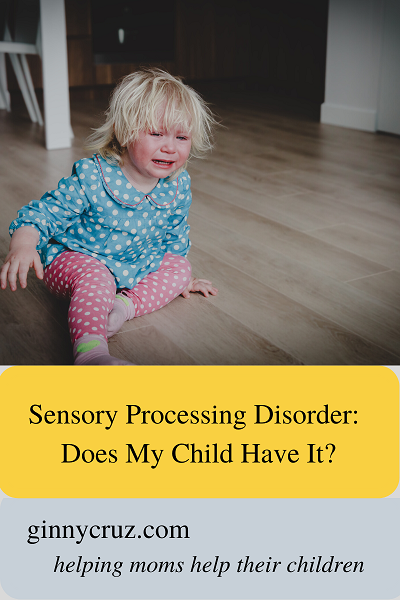Sensory Processing Disorder: Does My Child Have It?
Sensory Processing Disorder (SPD) is a condition where the signals from the various sensory systems (sight, touch, taste, etc.) either go undetected or are not organized by the brain into an appropriate response. A child with SPD has difficulties processing information through the various sensory systems and this creates challenges in accomplishing everyday tasks. These challenges may look like clumsiness, behavioral issues, anxiety, depression, and diminished focus on a task and can contribute to difficulties in school and social interactions.
Your brain is a massively complex system. Not only does it control motor movements, such as crawling or walking, but it also takes in, and makes sense of, sensations from the world via the sensory systems of touch, taste, smell, sight, hearing, movement in space (vestibular system), and pressure or position sense (proprioceptive system). Typically, your body senses something and a motor response is generated. For example, your baby sees (visual system) a banana and gags (motor response). Or your child cries (motor response) every time you lay her down (vestibular system) on the bed.
It is typical for babies and toddlers to have sensations they don’t like or like too much. After all, they’re learning about the real world and must learn to adapt to it. Avoiding or overly enjoying sensations becomes problematic when the sensations they avoid (sensory avoidance) or can’t get enough of (sensory seeking) interfere with development and academics. For example, your toddler cannot sit still, is constantly on the move, and loves crashing into things. These are behaviors of a child who may be seeking out the sensations of movement and pressure (crashing). If this continues, sitting in circle time at preschool will be problematic. If your kid avoids smooth foods then avoiding ice cream at a birthday party may be socially awkward for your child.
We all have sensory quirks. Maybe you chew on your pen when you concentrate or you cannot tolerate tags in your clothes. All of us adapt our lives according to sensations we enjoy or hate. When something you enjoy too much or cannot deal with interferes with your performance at school or work, you have a potential problem.
Complete the checklist below to find out if your little one is struggling to manage sensations.
Infant/Toddler Checklist
___ My child has problems eating
___ My child refuses to go to anyone but me
___ My child has trouble falling asleep or staying asleep
___ My child is extremely irritable when I dress them or seems uncomfortable in clothes
___ My child rarely plays with toys, especially ones requiring finger dexterity
___ My child has difficulty shifting focus from one thing to another
___ My child does not notice pain or is slow to respond when hurt
___ My child resists cuddling and may arch away from the person holding them
___ My child cannot calm self by sucking on a pacifier, looking at toys, or listening to my voice
___ My child has a “floppy” body, bumps into things, has poor balance
___ My child does little to no babbling or vocalizing
___ My child is easily startled
___ My child is extremely active, constantly moving body/limbs, or turns endlessly
___ My child seems delayed in crawling, standing, walking, or running
Preschool Checklist
___ My child has difficulty with toilet training
___ My child is overly sensitive to stimulation and overreacts or avoids touch, noise, smells, etc.
___ My child is unaware when bumped/touched unless it is with extreme force/intensity
___ My child has difficulty learning and avoids fine motor tasks such as using crayons or fastening clothes
___ My child seems unsure how to move their body in space and is clumsy and awkward
___ My child has trouble learning new motor tasks
___ My child is in constant motion
___ My child gets in everyone else’s space and/or touches everything around them
___ My child has difficulty making friends (overly aggressive or passive/withdrawn)
___ My child is intense, demanding, or hard to calm and has difficulty with transitions
___ My child has sudden mood changes and temper tantrums that are unexpected
___ My child seems weak, slumps when sitting/standing, prefers sedentary activities
___ My child’s speech is hard to understand
___ My child does not seem to understand verbal instructions
If your child has more than a few items checked, it’s time to talk to your child’s doctor and request a developmental evaluation. These lists are not exhaustive and serve only as a screening. A more detailed evaluation is needed to determine if your child has SPD or simply has some bothersome quirks. Whatever you are concerned about, please bring them to the attention of your child’s physician.
Early identification of difficulties within the sensory systems is recommended. Treatments for SPD are available and are provided by an occupational or physical therapist with training in sensory processing disorder treatments. The purpose of these treatments is to help your child learn to manage their sensory behaviors to allow for proper development and school success.
Don’t wait. Get answers. Early detection and treatment will help your child succeed.
Other resources:
(Photo: Adobe Stock)

